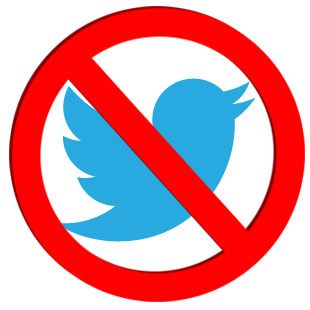In a move that some pundits are calling a step back from modernity, the Quebec judiciary has issued a ban as of April 15 on texting, tweeting, and all other forms of electronic communication from the courtroom during proceedings before the Court of Appeal of Quebec, the Superior Court of Quebec, and the Quebec Court.
 “[All people are] prohibited from diffusing or communicating text messages, observations, information, notes, photographs, audio, or video recordings from inside a court room to the outside world,” reads the new directive.
“[All people are] prohibited from diffusing or communicating text messages, observations, information, notes, photographs, audio, or video recordings from inside a court room to the outside world,” reads the new directive.
In interviews with Quebec media, the associate chief justice of Quebec’s Superior Court acknowledged the growing popularity of texting and, in particular, tweeting live from courtrooms.
But Justice Robert Pidgeon said after considering the results of two court cases in 2012 in which journalists were permitted to use the devices in the courtroom, he and his fellow judges concluded that use of the devices runs afoul of the principles of the court system.
“We are aware that many people today communicate by text messaging,” Pidgeon told Quebec City’s Le Soleil newspaper in early April. “Our decision was based on issues of decorum (and) the maintenance of order.”
According to Pidgeon, journalists were permitted to send text messages and tweets using their cell phones and iPads in the courtroom last spring during the murder trial in Quebec City of former appea court judge Jacques Delisle, who was convicted of the premeditated murder of his wife (a decision now under appeal).
But he said it was upsetting that photos taken inside the courtroom appeared publicly — a clear contravention of courtroom rules.
“I didn’t like that,” said Pidgeon. “That sent us a signal.”
He added that similar incidents occurred in December when journalists in Montreal were allowed to send messages from inside the courtroom during the trial of special effects artist Rémy Couture, who was acquitted of charges of corrupting morals.
Though lawyers and journalists can continue to use electronic devices, including cell phones, to consult notes or documents inside the courtroom (in silence, of course), the new directive prohibits the transmission of any information about proceedings to the outside world.
“It will have to be respected,” said Pidgeon, adding that courtroom constables will be tasked with ensuring compliance with the new directive. Failure to do so, he warned, will result in unspecified sanctions by the presiding judge.
According to Pidgeon, only three courts in Canada — the Nova Scotia Court of Appeal, and both the Supreme Court and Provincial Court of British Columbia — allow journalists to transmit information from inside the courtroom during proceedings.
Both media outlets and journalists across Quebec decried the decision.
“[The Quebec judiciary] has missed an important rendez-vous,” said Brian Myles, president of the Fédération professionnelle des journalists du Québec. “I find it more of a shame for the judges and justice than for journalists. They’ve taken away a chance to be better understood by the public by restraining the use of social media.”
 “[All people are] prohibited from diffusing or communicating text messages, observations, information, notes, photographs, audio, or video recordings from inside a court room to the outside world,” reads the new directive.
“[All people are] prohibited from diffusing or communicating text messages, observations, information, notes, photographs, audio, or video recordings from inside a court room to the outside world,” reads the new directive.In interviews with Quebec media, the associate chief justice of Quebec’s Superior Court acknowledged the growing popularity of texting and, in particular, tweeting live from courtrooms.
But Justice Robert Pidgeon said after considering the results of two court cases in 2012 in which journalists were permitted to use the devices in the courtroom, he and his fellow judges concluded that use of the devices runs afoul of the principles of the court system.
“We are aware that many people today communicate by text messaging,” Pidgeon told Quebec City’s Le Soleil newspaper in early April. “Our decision was based on issues of decorum (and) the maintenance of order.”
According to Pidgeon, journalists were permitted to send text messages and tweets using their cell phones and iPads in the courtroom last spring during the murder trial in Quebec City of former appea court judge Jacques Delisle, who was convicted of the premeditated murder of his wife (a decision now under appeal).
But he said it was upsetting that photos taken inside the courtroom appeared publicly — a clear contravention of courtroom rules.
“I didn’t like that,” said Pidgeon. “That sent us a signal.”
He added that similar incidents occurred in December when journalists in Montreal were allowed to send messages from inside the courtroom during the trial of special effects artist Rémy Couture, who was acquitted of charges of corrupting morals.
Though lawyers and journalists can continue to use electronic devices, including cell phones, to consult notes or documents inside the courtroom (in silence, of course), the new directive prohibits the transmission of any information about proceedings to the outside world.
“It will have to be respected,” said Pidgeon, adding that courtroom constables will be tasked with ensuring compliance with the new directive. Failure to do so, he warned, will result in unspecified sanctions by the presiding judge.
According to Pidgeon, only three courts in Canada — the Nova Scotia Court of Appeal, and both the Supreme Court and Provincial Court of British Columbia — allow journalists to transmit information from inside the courtroom during proceedings.
Both media outlets and journalists across Quebec decried the decision.
“[The Quebec judiciary] has missed an important rendez-vous,” said Brian Myles, president of the Fédération professionnelle des journalists du Québec. “I find it more of a shame for the judges and justice than for journalists. They’ve taken away a chance to be better understood by the public by restraining the use of social media.”







